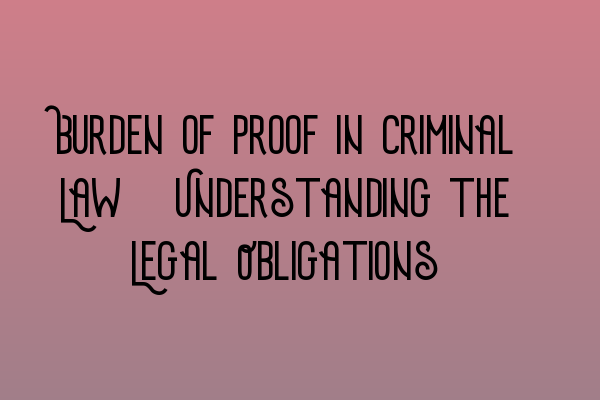Burden of Proof in Criminal Law: Understanding the Legal Obligations
In criminal law, the burden of proof plays a crucial role in determining the outcome of a case. It is the responsibility of the prosecution to prove beyond a reasonable doubt that the defendant is guilty of the crime they have been charged with. Understanding the legal obligations surrounding the burden of proof is essential for both legal professionals and individuals involved in criminal cases.
What is the Burden of Proof?
The burden of proof is the obligation to establish the truth of a particular fact or issue in a legal proceeding. In criminal cases, it refers to the duty of the prosecution to prove that the accused is guilty of the alleged offense. It is important to note that the burden of proof lies solely on the prosecution and not on the defendant. This means that the defendant is presumed innocent until proven guilty.
Proof beyond a reasonable doubt is the highest standard of proof in criminal law. It requires the prosecution to present evidence that is so convincing that there can be no reasonable doubt in the minds of the jurors or judge as to the defendant’s guilt. This standard ensures that the potential consequences of a criminal conviction, such as imprisonment, are reserved for cases where guilt is established with near certainty.
The Legal Obligations of the Prosecution
When it comes to the burden of proof, the prosecution has certain legal obligations that must be fulfilled. These obligations include:
- Presentation of evidence: The prosecution must present admissible evidence to support each element of the offense charged. This can include witness testimony, physical evidence, expert opinions, and other relevant documentation. The quality and credibility of the evidence play a crucial role in establishing guilt beyond a reasonable doubt.
- Establishing a logical and coherent narrative: The prosecution must construct a clear and coherent narrative that explains how the evidence presented proves the defendant’s guilt. It is essential for the prosecution to connect the dots and provide a convincing argument that leaves no room for doubt.
- Challenging the defense’s case: The prosecution should actively challenge any defenses put forward by the defendant. This involves cross-examining defense witnesses, presenting counter-evidence, and refuting any alternative explanations or theories that may cast doubt on the defendant’s guilt.
By fulfilling these legal obligations, the prosecution seeks to satisfy the burden of proof and persuade the judge or jury of the defendant’s guilt.
The Role of the Defense
While the burden of proof lies with the prosecution, the defense also plays an important role in a criminal trial. The defense has the opportunity to challenge the prosecution’s case and present evidence or arguments in favor of the defendant’s innocence.
The defense may seek to undermine the prosecution’s evidence by highlighting inconsistencies, introducing reasonable doubt, or presenting an alternative narrative that raises questions about the defendant’s guilt. The defense can call their own witnesses, cross-examine the prosecution’s witnesses, and present any evidence that may support a different interpretation of the events.
It is important to remember that the burden of proof never shifts to the defendant. The defense’s role is to create doubt in the minds of the judge or jury, not necessarily prove the defendant’s innocence.
Conclusion
The burden of proof is a fundamental principle in criminal law. It places the responsibility on the prosecution to establish the guilt of the accused beyond a reasonable doubt. By presenting admissible evidence, constructing a logical narrative, and challenging the defense’s case, the prosecution seeks to satisfy its legal obligations and persuade the judge or jury of the defendant’s guilt.
Understanding the burden of proof is crucial for legal professionals involved in criminal law cases. If you are preparing for the SQE 1 or SQE 2 exams, it is important to have a solid understanding of this concept. You can enhance your knowledge and improve your chances of success by enrolling in SQE preparation courses offered by SQE 1 Preparation Courses and SQE 2 Preparation Courses.
For additional practice, you can also take advantage of SQE 1 Practice Exam Questions and SQE 1 Practice Mocks FLK1 FLK2 to test your knowledge and familiarize yourself with the exam format. Remember to stay updated with the SRA SQE Exam Dates to plan your preparation accordingly.
By gaining a comprehensive understanding of the burden of proof and utilizing the resources available, you can enhance your legal expertise and increase your chances of success in criminal law.
